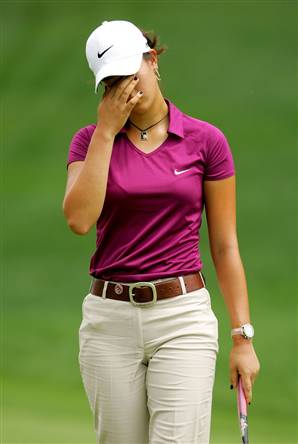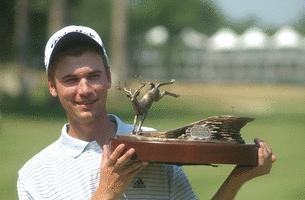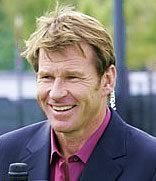
OK, I've seen enough. Stop the fight. No mas! No mas!
In case you missed it, Michelle Wie shot 77 in the first round of the John Deere Classic, leaving her 13 strokes off the early lead. So forget the talk of her becoming the first woman to make the cut in a PGA Tour event in 61 years. Forget the talk of her earning her PGA Tour card any time soon.
After the misery of tomorrow's second round is behind her, Wie should turn her attention toward winning a tournament on the LPGA Tour. Other than in her classroom at school, or maybe the mall with her friends, the LPGA is where she ought to be -- at least for now.
And now, for the post round interview:
Q: We thank Michelle Wie for stopping in after a 6 over 77 in today's first round
of the John Deere Classic. I know it's not the start you hoped for today. First couple holes
you had a couple balls go right off the tee it seemed today.
MICHELLE WIE: Yeah. I mean, it was very uncharacteristic of me to do that, but I felt like
considering that I had the water hazard penalties, considering that I had to call
unplayable, considering that I hit my driver like 50 yards right, I felt like I played
really well. I felt like I made a lot of great up and downs, I felt like I putted great, my
irons were good.
You know, on the last couple holes during the back nine, I felt like my driver was working
very well. I feel like I have a lot of confidence going into tomorrow.
Q: Looks like you shook off that front nine on the back there. Tell us what was
the change from the front to back?
MICHELLE WIE: You know, I just changed my posture a little bit and tweaked around a little
bit, played around with my shots. It couldn't get any worse, so I just played around with
it. Luckily it worked, so I'll keep that same mentality going for tomorrow.
Q. That bug on the second tee kind of seemed to get to you a little bit.
MICHELLE WIE: I mean, literally I had like five of them on me. As soon as I got on the ball
I mean, it's okay if the bugs are like around the ball, I can handle that. But they were
crawling on my arm, they were on my hand, they were on my head. I mean, it was just
ridiculous. I had to step back like five times. It was just very unfortunate.
Q. Did that kind of throw you off, your concentration?
MICHELLE WIE: I would like to say it didn't, but it bothered me a little bit. Bugs on me, I
hate bugs, and I was starting to get a little aggravated like the fifth time I stepped out.
I was a little aggravated, but I felt like I shook it off. Obviously I didn't hit that tee
shot the way I wanted to, but I don't think it was because of the bugs.
Q. How were you feeling physically today as far as coming into the round? Were you tired at
all and did you have any aches and pains or anything during the round?
MICHELLE WIE: No, I felt pretty good. It was very hot out there. I'm not really used to
wearing long pants in the heat, but it was okay. I mean, obviously there's a lot of hills on
this golf course, but I didn't really feel tired. I was sweating a lot out there, but I felt
like I hydrated myself very well when I had to, and I kept my energy level up all around.
Q. Last year after the first round you were 1 under. Just talk about how disappointing I
guess it is for you to be where you are now compared to where you were at this time last
year.
MICHELLE WIE: Well, I didn't make the cut shooting 1 under on the first round, so maybe
shooting 6 over might do it (laughter).
Q. Where you were in the Sony Open after the first round, 79, you came back pretty well. Can you do that again here tomorrow, and if you do, are you going to the last four or five holes
thinking, hey, maybe I can make the cut?
MICHELLE WIE: Definitely. I feel like I have a really good round in me. I feel like if I hit
the fairways more, if I was in the fairway I could have shot a lot under par. I felt like my
irons are really good right now, my putting feels really good, and I really feel like I can
do it. I feel really motivated to do it.
Q. Talk about 16 if you would, that terrific birdie and the gallery goes nuts. Can you kind
of feel the excitement build?
MICHELLE WIE: It was pretty amazing after I made that chip. The applause was really loud.
That's why I play, to have those moments. It's so wonderful, you can't really put it in
words. You just feel really good. That's why I'm doing this, to feel those moments.
Q. After the thing with the bugs, you went off to the right a couple times, then you went
off to the left a couple times. Did you overcompensate do you think?
MICHELLE WIE: No. I mean, I think it's very natural to compensate maybe or overcompensate.
Like I said, I played around with it, but eventually it went straight, so that was a
success.
Q. Early, the first 30 minutes, 60 minutes, the swing was off a little bit, the right shots
that he talked about. Is that nerves or is that just one of the days of golf?
MICHELLE WIE: No, it was just my evil twin sister playing (laughter).
Q. What's it like for you playing with so much attention being paid to everything you do?
MICHELLE WIE: I like it. I mean, I'm very grateful for it. I think that if I didn't have
these fans, if I didn't have the critics, it wouldn't be as much fun. All these people
rooting for you, it's just wonderful. I love it.
Q. There was a minor issue with your hip yesterday. Did that get worked out and was that at
all a problem today?
MICHELLE WIE: Yeah, it was a little hurting, you know. I went to the trailer here, and they
were really wonderful to help me out, and I went in yesterday and I went in this morning,
and it feels really good right now, so I'm good.
Q. Do you know what kind of bugs they were on the second hole, and were you nervous that
they might be a bee?
MICHELLE WIE: No, they were not a bee. They were pretty big, though, and they don't want those bugs do not want me to find out what kind of bugs they were, because I am going to go
out and kill them. I'm calling the exterminator tomorrow (laughter).






